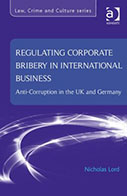Regulating Corporate Bribery in International Business: Anti-Corruption in the UK and Germany

Author: Nicholas Lord
Publisher: Farnham, Surrey, UK; Burlington, VT: Ashgate, 2014. 214p.
Reviewer: Jonathan Mukwiri | May 2015
This book, by Nicholas Lord, should appeal to a wide range of readers, including policymakers, law enforcement agents, legal practitioners and academics who are interested in the criminological perspective of regulating corporate bribery and enforcing anti-bribery laws. Dr. Lord’s book started life as a doctoral research thesis one backed up by empirical research. Taking case studies from the UK and Germany, the underlying inquiry of the book is how national authorities go about dealing with corporate offenders within an international context relative to overseas bribery. It is a compact monograph, well structured, and containing critically analyzed scholarship. The book is divided into nine chapters; each chapter begins with an introduction and ends with a conclusion; all of which makes for an easy read. That it is a product of legal research is evident in the bibliography extending to 10 pages, which cites books and articles from leading works on the subject. Readers interested in the regulation of corporate bribery should find this book appealing as an essential resource.
The author highlights the regulatory problem of enforcement, noting that enforcement authorities remain constrained by different domestic operational frameworks and jurisdictional boundaries. This is because national authorities are often pressured to respond to trans-national corporate bribery using inter-national frameworks for enforcement that are distanced from the context and cultural pressure faced at the national operational level. In its analysis of the problem, the book uses concepts of regulation theory to understand the emerging regulatory responses to international corporate bribery. It also uses empirical evidence to aid understanding of the anti-bribery enforcement responses.
Lord lays out the legal framework underpinning anti-bribery laws in the UK and Germany, and comparatively refers to the laws of other jurisdictions. The book does not delve into a detailed analysis of the provisions of anti-bribery laws, but rather deals with the question of enforcement. It observes that in times of austerity, enforcement authorities face difficulties in criminally prosecuting corporations, and as such, there is a tendency to shift towards civil settlements and negotiations. Different factors also lead to reliance on a mixture of enforcement responses: state agencies, self-regulatory practices, and hybrids.
Turning to the central argument of enforcement presented in the book, the key contribution can be thus summarised: whilst there are significant differences (for example, centralised or decentralised systems, legal cultures) between the UK and Germany, both UK and German anti-bribery authorities (a) face similar difficulties (such as procedural, evidential, legal and jurisdictional) in enforcement; (b) are converging towards similar prosecution policies (for example, the negotiation of civil settlements for corporations); and (c) have the same default position of accommodation by state agencies, even where the will to enforce the law is high.
In sum, this book provides a detailed analysis of the enforcement issues faced by authorities in the UK and Germany. It is a highly recommended reading on the enforcement of anti-bribery laws.
Dr. Jonathan Mukwiri, Lecturer in Commercial Law, Durham University


